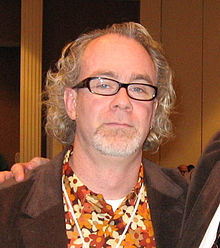William Shunn
William Shunn | |
|---|---|
 William Shunn at the 2007 World Fantasy Convention | |
| Born | Donald William Shunn II August 14, 1967 Los Angeles, California, U.S. |
| Occupation | Short story writer |
| Nationality | American |
| Education | University of Utah (BS) |
| Period | 1993–present |
| Genre | Science fiction |
| Website | |
| www | |
William Shunn (born August 14, 1967) is an American science fiction writer and computer programmer. He was raised in a Latter-day Saint household, the oldest of eight children. In 1986, he served a mission to Canada for the Church of Jesus Christ of Latter-day Saints, but was arrested for making a false bomb threat, for the purpose of preventing his fellow missionary from returning home.[1]
Life and career[edit]
Shunn received a B.S. in computer science at the University of Utah in 1991.[2] He went to work for WordPerfect Corporation and was part of the team that developed WordPerfect 6.0 for MS-DOS. In 1995, he moved from Utah to New York City. He left the LDS Church at the same time and created one of the earliest ex-Mormon web sites.[3]
Shunn's first professional short story was published in The Magazine of Fantasy & Science Fiction in 1993.[4] He has been nominated once for the Hugo Award and twice for the Nebula Award.
Shunn is the author of a 2015 memoir, The Accidental Terrorist: Confessions of a Reluctant Missionary.[5]
In the wake of the September 11, 2001 attacks, he created what may have been the first online survivor registry.[6][7]
Shunn is also known for creating a web site that offers daily hints to The New York Times Spelling Bee. This tool is commonly used within the community of Spelling Bee players.[8]
Awards and nominations[edit]
- 2001: Nominated for Nebula Award for Best Novelette for "Dance of the Yellow-Breasted Luddites" (Vanishing Acts, ed. Ellen Datlow, Tor Books, New York, NY, 2000)
- 2006: Nominated for Hugo Award for Best Novella and Nebula Award for Best Novella for "Inclination" (Asimov's Science Fiction, April/May 2006)
Bibliography[edit]
Fiction[edit]
- Netherview Station story series:
- Strong Medicine (2003)
- Love in the Age of Spyware (2003)
- An Alternate History of the 21st Century, chap-book (2007)
Nonfiction[edit]
- The Accidental Terrorist: Confessions of a Reluctant Missionary (2015)
In 1993 or 1994, Shunn wrote a style guide for standard manuscript format (the generally accepted method for preparing a fiction manuscript for submission to professional markets), based on advice gathered at the Clarion Workshop and elsewhere.[9] First published to the web in 1995, this guide (and its later revisions),[10] commonly known as "Shunn format"[citation needed], has since been adopted by many magazines as a requirement for submissions[citation needed].
References[edit]
- ^ "Missionary gets day's jail, $2,000 fine for bomb hoax", Monica Zurowski, Calgary Herald, February 27, 1987
- ^ "Through the Years", Continuum: The Magazine of the University of Utah, Fall 2007
- ^ "Mormon Matter"
- ^ Editorial introduction to "From Our Point of View We Had Moved to the Left," The Magazine of Fantasy and Science Fiction, February 1993
- ^ Shunn, W., The Accidental Terrorist: Confessions of a Reluctant Missionary, Sinister Regard (November 10, 2015). ISBN 978-1941928554
- ^ Journalism After September 11, Barbie Zelizer and Stuart Allan (eds), Routledge, 2002, ISBN 0-415-28799-5
- ^ Cooper, Charles (13 September 2001). "Online help spawns hope for victims". CNET. Retrieved 30 June 2022. Archived version: https://web.archive.org/web/20010913185424/http://news.cnet.com/news/0-1014-201-7147460-0.html Retrieved 30 June 2022.
- ^ Amlen, Deb (16 October 2020). "The Genius of Spelling Bee". The New York Times. Retrieved 4 November 2021.
- ^ W. Shunn, "Introduction to Proper Manuscript Format", shunn.net. Retrieved 8 Jun 2022
- ^ W. Shunn, "Proper Manuscript Format", shunn.net. Retrieved 17 Mar 2022. Earlier version published on Writers Write: The Internet Writing Journal, December 1998: https://www.writerswrite.com/journal/proper-manuscript-format-12984 Retrieved 17 Mar 2022. Earliest version published online in late 1995: https://shunn.net/format/original/ Retrieved 8 Jun 2022.
External links[edit]
- Official site
- William Shunn at the Internet Speculative Fiction Database
- "The Practical Ramifications of Interstellar Packet Loss" (short story)
- "Love in the Age of Spyware" (short story from Salon, 16 July 2003)
- "Strong Medicine" (short story from Salon, 10 November 2003)
- "The Missionary Imposition" (personal essay)
- Podcast of Shunn comparing the Book of Mormon to Lord of the Rings
- Spelling Bee Solver
- 1967 births
- American science fiction writers
- Former Latter Day Saints
- Living people
- American Mormon missionaries in Canada
- University of Utah alumni
- 20th-century Mormon missionaries
- American male novelists
- American male short story writers
- 20th-century American novelists
- 21st-century American novelists
- Novelists from Los Angeles
- 20th-century American short story writers
- 21st-century American short story writers
- 20th-century American male writers
- 21st-century American male writers
